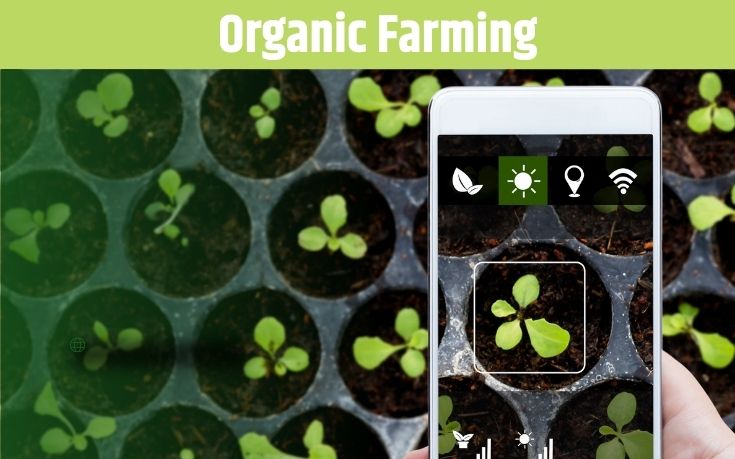Hello there, Green Revolution readers! Imagine a future wherein the food on your plate not only nourishes you but helps rejuvenate the planet as well. Well, scientists now, globally, believe that organic farming can hold the key to realizing it. With the onset of accelerating climate change, the quest for sustainable agricultural practices becomes critical. Join me through an exploration of how organic farming could be a game-changer in the fight against climate change and building a healthier future for one and all.
Organic Farming
Organic farming is the kind of agriculture that deals basically with natural processes, biodiversity, and healthful soils. Synthetic fertilizers, pesticides, and other GMOs are avoided; instead, organic inputs like compost, green manure, and biological control on pests are administered. This aims to acquire a sustainable and self-sufficient agroecosystem that guarantees fertility and causes less environmental harm.
Organic farming is associated with increased soil fertility and biodiversity, resulting in healthy and high-quality food; by definition, it is a way to reduce the most negative repercussions stemming from conventional agriculture. But can it also help fight global climate change?
Carbon Sequestration: Capturing Carbon in Soils
Carbon sequestration is one of the most impoverished ways in which organic farming can actively help combat climate change. Plants absorb carbon dioxide from the atmosphere via photosynthesis. Organic farming methods, such as crop rotation, cover cropping, and using compost, improve the soil’s capacity to store carbon.
Healthy soils rich in organic matter are carbon sinks, storing away CO2 that otherwise would provide for the greenhouse effect. In enhancing soil health, therefore, organic farming not only raises agricultural productivity but also helps lower the concentration of CO2 in the atmosphere.
Reduce Greenhouse Gas Emission
It can reduce, in several ways, the GHG emissions. In conventional farming, synthetic fertilizers and pesticides are important components in it; the production and application of which emit large amounts of CO2, nitrous oxide, and methane into the atmosphere. All these synthetic inputs are eliminated by organic farming, thus lowering the overall carbon footprint.
Besides, most of the organic farms consume fewer energy-intensive practices. For instance, using animal manure and compost for fertilizers reduces energy consumption in its production and transportation. Besides, organic farms hire more human resources and less machinery, hence consuming less energy and emitting fewer emissions.
Improved Biodiversity and Ecosystem Resilience
Biodiversity forms the bedrock of organic farming. Rich flora and fauna, from helpful interspecies to wildlife, is encouraged at an organic farm. The result is resilient systems that can cope with climatic stresses. Diverse crops can improve soil health, _marshall_ against pest outbreaks, and increase farm flexibility to changing climatic conditions.
Healthy, biodiverse ecosystems are resilient to these extreme weather events—droughts and floods—that are the hallmarks of climate change. Organics empower this biodiversity, hence building resilience against these challenges and ensuring stable food supplies.
Water Conservation and Soil Health
The more climate change increases, the more scarce water becomes, and precipitation becomes a challenge.
Multiple practices in organic farming, like mulching and cover cropping, improve soil structure and the water-holding capacity of soils. Therefore, healthy soils with high organic matter content will hold more water than any other soils, using less irrigation and thus saving this valuable resource.
It also reduces erosion and degradation of soils, which conventional farming, through monocropping and heavy tillage, enhances. Through the maintenance of soil health, organic farming ensures farmland productivity and sustainability amidst climate change.
Supporting Pollinators and Wildlife
As far as food production is concerned, there is a lot done, especially through pollinators such as bees and butterflies. However, they face various threats to their survival, especially from pesticide use, habitat loss, and shifting climatic conditions. Organic farming will avoid lousy chemicals in farms and offer habitats with food and shelter for such pollinators.
By supporting the maintenance and enhancement of biodiversity, organic farms provide a haven to pollinators and other wildlife. This not only safeguards the environment but also ensures that crops are well-pollinated for production.
Challenges and Opportunities
Though much potential lies in organic farming, the harms are not ignored. The yields for organic farming turn out to be lower than those of conventional agriculture, thus scaring off the ability to feed the world’s growing population. Nevertheless, in an analysis evaluating more than 100 studies comparing organic and conventional farming, it’s established that the former is competent to be as productive as the latter, particularly at big farms with good management.
Initial investments that need to be acquired for organic farming practice are in knowledge and training, and related infrastructure. Education, subsidies, and market access are highly important in making this shift realizable to farmers. Organic product demand by consumers is already increasing; however, wider diffusion of these products will require changes in policies with some incentives.
Consumer Power
Consumers can make a difference in the future of organic agriculture. In supporting sustainable farming, consumers’ choice of organic products signals demand for environment-friendly options. This, in turn, causes increasing numbers of farmers to shift to organic practices and subsequently invest in organic farming infrastructure for it to become widespread.
This may be done by supporting local organic farmers, subscribing to community-supported agriculture, influencing policies that forty support organic farming, and building more resilience to climate change in the food system.
Final Words
It has an incredible solution to some of the stringent environmental challenges human civilization faces presently. The way organic farming will help in controlling climate change is through food, carbon sequestration, reduction of GHG emissions, water conservation, and support for biodiversity. While challenges remain, the potential benefits make it a path worth pursuing.
In the effort to secure a food future, organics could hold some very valuable strategies for sustainability and resilience. That vision would realize itself in the collaboration among farmers, consumers, and policymakers, to hand over a healthier planet to generations to come. Let us sow greener futures—one organic farm at a time.





